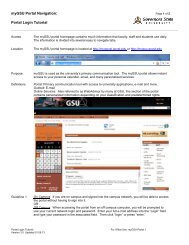Master of Occupational Therapy Program - Governors State University
Master of Occupational Therapy Program - Governors State University
Master of Occupational Therapy Program - Governors State University
You also want an ePaper? Increase the reach of your titles
YUMPU automatically turns print PDFs into web optimized ePapers that Google loves.
<strong>Governors</strong> <strong>State</strong> <strong>University</strong><br />
College <strong>of</strong> Health and Human Services<br />
<strong>Occupational</strong> <strong>Therapy</strong> Department<br />
Policy: Non-Academic Performance Number: OT 305 Page 1 <strong>of</strong> 1<br />
Effective: Reviewed: 6/11<br />
Supersedes: Revised: 7/21/09<br />
Policy:<br />
Non-academic performance is considered part <strong>of</strong> the student’s overall academic performance.<br />
These criteria must be met in addition to academic criteria to achieve and maintain candidacy in<br />
the program. Assessment <strong>of</strong> these criteria and response to infractions is as per the department<br />
procedure below.<br />
1.0 Students are required to meet the following criteria.<br />
1.1 Communication abilities for communicating with patients and other<br />
clients served.<br />
1.2 Pr<strong>of</strong>essional demeanor includes the ability to act independently, and<br />
ability to cooperate with others. Examples <strong>of</strong> these behaviors may include the<br />
ability to accept and respond appropriately to criticism, maintaining a<br />
pr<strong>of</strong>essional appearance in terms <strong>of</strong> dress and hairstyle, maintaining<br />
confidentiality, etc.<br />
Purpose:<br />
Interpersonal skills, pr<strong>of</strong>essional behavior and other non-academic skills are essential in the<br />
functioning <strong>of</strong> an occupational therapist, therefore these skills and behaviors are expected during<br />
student tenure.<br />
Procedure:<br />
1.0 The <strong>Occupational</strong> <strong>Therapy</strong> <strong>Program</strong> faculty addresses these issues through regular<br />
reviews <strong>of</strong> student progress during faculty meetings.<br />
2.0 Potential problems are raised as soon as possible through regular review <strong>of</strong><br />
student’s progress during faculty meetings.<br />
2.1 A faculty advisor will initiate discussion with the student. Potential<br />
problems are raised as soon as possible with the student.<br />
2.1.1 A remediation plan is developed and includes a time line for<br />
student response.<br />
2.2 On rare occasions it may be necessary to dismiss a student from the<br />
program for non-academic performance.<br />
2.2.1 Before arriving at such a decision there will be an extensive review<br />
<strong>of</strong> the remediation plan and student response.





